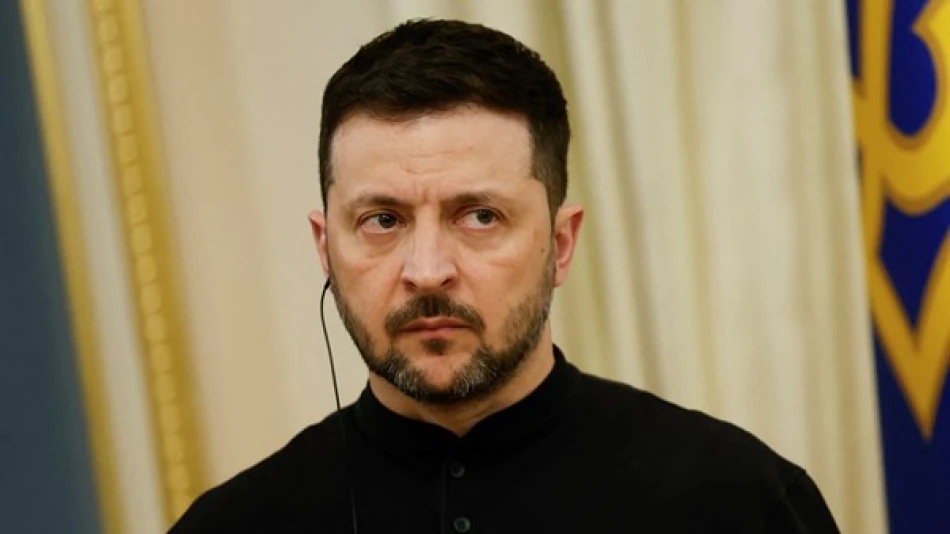
Ukrainian President Appoints Shmyhal as New Prime Minister, Signaling Shift in Governance
Ukraine's Zelensky Taps Deputy PM Sviridenko for Top Government Role Amid Wartime Economic Pivot
Ukrainian President Volodymyr Zelensky has nominated Deputy Prime Minister Yulia Sviridenko to lead the government as Prime Minister, signaling a strategic shift toward bolstering Ukraine's economic resilience and domestic weapons production capabilities during the ongoing conflict with Russia. The appointment reflects Kyiv's growing focus on long-term economic sustainability alongside military defense.
A Wartime Leadership Reshuffle
During a Monday meeting in Kyiv, Zelensky announced his decision to entrust Sviridenko with leading what he described as a "transformation process" within Ukraine's executive branch. The move comes as Ukraine faces mounting pressure to strengthen its economic foundation while maintaining military operations against Russian forces.
Zelensky outlined three key priorities for the new leadership: enhancing Ukraine's economic potential, expanding support programs for Ukrainian citizens, and crucially, increasing domestic weapons production. This emphasis on local defense manufacturing suggests Ukraine is preparing for a prolonged conflict while reducing dependence on foreign military aid.
Economic Expertise in Crisis Management
Sviridenko brings significant economic credentials to the role at a critical juncture. As Deputy Prime Minister, she has been instrumental in managing Ukraine's wartime economy, including overseeing reconstruction efforts and maintaining essential services under extreme conditions. Her background positions her well to navigate the complex challenge of rebuilding while fighting.
The timing of this appointment is particularly significant. Ukraine has demonstrated remarkable economic resilience despite the war, with GDP contractions less severe than initially projected. However, sustaining this performance requires strategic leadership focused on both immediate survival and long-term recovery.
Strategic Implications for Ukraine's Future
Domestic Weapons Production Priority
The emphasis on increasing local weapons manufacturing represents a fundamental shift in Ukraine's defense strategy. Rather than relying solely on Western military aid, which can be subject to political changes and supply constraints, Ukraine is positioning itself for greater self-sufficiency in defense capabilities.
This approach mirrors strategies employed by other nations facing prolonged security challenges, where domestic production becomes both an economic driver and a strategic necessity. The move could attract international defense partnerships while building Ukraine's industrial base for post-war reconstruction.
Economic Transformation Under Fire
Sviridenko's appointment signals Ukraine's commitment to economic modernization even during wartime. This dual focus on defense and development reflects lessons learned from other conflict zones where economic collapse often proves as devastating as military defeats.
The "transformation process" Zelensky referenced likely encompasses broader reforms aimed at streamlining government efficiency, attracting international investment, and preparing for eventual EU integration. These changes could position Ukraine for rapid post-conflict growth, assuming successful resolution of the current crisis.
Market and International Perspectives
For international investors and aid organizations, this leadership change suggests Ukraine's commitment to institutional stability and economic reform despite ongoing conflict. Sviridenko's economic expertise may facilitate more effective utilization of international financial support and reconstruction funds.
The focus on domestic production capabilities could also create new opportunities for international partnerships in defense technology and manufacturing, potentially making Ukraine a significant player in global defense markets post-conflict.
This appointment demonstrates Ukraine's evolution from crisis response to strategic planning, indicating confidence in long-term survival and eventual victory. For global markets, it represents both the resilience of Ukrainian institutions and the potential for significant economic opportunities in a reconstructed, EU-integrated Ukraine.
Most Viewed News

 Layla Al Mansoori
Layla Al Mansoori






